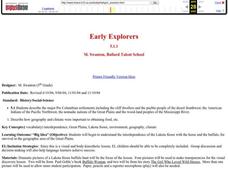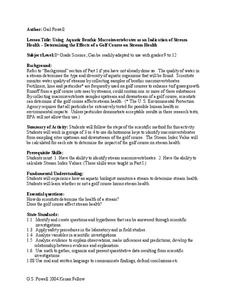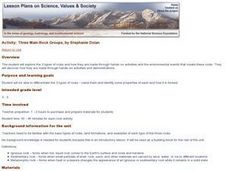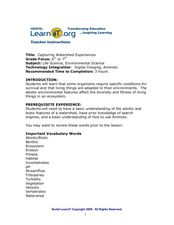Curated OER
Early Explorers
Fifth graders examine how the environment and climate affected Pre-Colombian settlements. In this civilization lesson, 5th graders view pictures of different Native American tribes in different places and discuss how different groups...
Curated OER
How Can We Help?
In this environmental issues worksheet, students read ten ways they can help the environment. Students tell how each idea helps. There are additional projects and recycling activity ideas here, but no questions to answer.
Kenan Fellows
Determining the Effects of a Golf Course on Stream Health
Do golf courses affect the water organisms in nearby streams and ponds? Small groups collect samples of water upstream and downstream from a golf course and analyze the macroinvertebrates found and the stream index values of the two...
Consumers Energy
The Cost of Electricity
How much is your toaster costing you every day? Young environmentalists calculate the monetary costs of household appliances based on their average consumption of wattage.
Kenan Fellows
The Newton Challenge
Make Newton proud. Scholars apply their understanding of forces and energy to an engineering design challenge. They learn about simple machines, create a presentation on Newton's laws, and develop a balloon-powered car.
Discovery Education
Make it all Better!
Discover how innovations can help your school and community. In the three-part STEM lesson, scholars learn the meaning of innovation and brainstorm innovations in their schools. They identify issues in their communities and think of...
Curated OER
Making Connections, Linking Population and the Environment
Learners find out that all habitats have a carrying capacity. They explore how the world's human population has grown markedly in the 20th century, and that humans impact environmental health. Students investigate that people can and...
Curated OER
History of the Earth
Students work together in groups to research the characteristics of the Mesozoic Era. Using various sources, they must include information about climate, landforms, plants and animals found during this time period. They create a...
Curated OER
Chemistry World The Five Types of Chemical Reactions
Learners research five types of chemical reactions in order to design a learning center. Students use technology to research and present their material.
Curated OER
Three Main Rock Groups
Students are introduced to igneous, sedimentary and metamorphic rocks. They use foods to demonstrate the basic formation of each type of rock, read books about rock formation and view related videos.
Curated OER
Ecology Club
Fifth graders measure their plants and take pictures, write down new
observations about their plants. They discuss taking plants home. When they take them home students carefully put a plastic bag over the top to keep the plants from...
Curated OER
Environment: The River Classroom
Seventh graders engage in hands-on experiments and activities dealing with rivers and greenways. They also observe lectures and demonstrations by experts in water and river restoration. Students and teachers participate in canoe trips...
Curated OER
Where Does All the Water Go?
Students view a demonstration of how groundwater flows and define several related vocabulary terms. They complete a worksheet, participate in discussion and make a poster.
Curated OER
Capturing Watershed Experiences
Students observe organisms found in the water. In this instructional activity on organisms, students collect water from local streams and tributaries in order to study the organisms found in the water. As a culminating activity, students...
Curated OER
An Underground River
Seventh graders describe how water flows through the ground, what an aquifer is and what soil properties are used to predict groundwater flow. They consider the affects of pollution on groundwater supplies and write a letter drawing...
Curated OER
Rockets on a Shoestring Budget
Students, operating under simulated budget constraints, build pop-rockets and launch them. Working in pairs, they complete budget worksheets and use their "Blast Off Bucks" to pay for the construction. They then redesign their rockets...
Curated OER
Climate and Periodic Functions: Science & Math Integration
Students complete a lab that introduce the scientific concept of climate on Earth. Following the lab, they complete further research on climate. Using average monthly temperatures students construct a mathematical model and analyze the...
Curated OER
Life Systems - Plant Growth
3rd graders will participate in a variety of tasks which help them to understand the basic concepts of plant growth. Research and reporting skills are developed as they gather information from various sources related to the use of plants...
Curated OER
The 400-acre wood
In this forest planning lesson plan, students visit the 400-acre wood website and work in groups to learn about the specific aspects of forest development. Students create, label and color a forest planning map and present their map to...
Curated OER
Ecotourism in National Parks and Wilderness
Students develop a plan for ecotourism after researching a nearby national park or wild area.
Curated OER
Get into the Flow with an Interactive Volcano
Young scholars research the structural elements of a volcano. They make a PowerPoint slide that contains five facts which will be added to a whole class slideshow. They add an interactive table of contents using action buttons.
Curated OER
Hazardous Waste Cleanup Methods
Students examine how hazardous wastes are cleaned up. They work together to identify the positives and negatives of cleaning up certain hazardous wastes. They answer questions as part of the activity.
Curated OER
Water Cycle Terrariums
Students explore the water cycle. They build a model of the water cycle in the form of a terrarium and explain how it demonstrates the water cycle. In addition, they draw a representation of the water cycle demonstrated in the terrarium.
Curated OER
Environment -- Unit on Globalization and the Environment
Students examine the effect of human activities on the environment. They discover issues that are causing problems around the world. They participate in a debate using their own research.

























